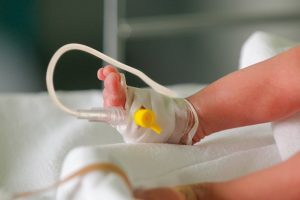 Working group on parenteral nutrition published new article on the process for the implementation of evidence-based parenteral nutrition in German perinatal centres.
Working group on parenteral nutrition published new article on the process for the implementation of evidence-based parenteral nutrition in German perinatal centres.
As a life-saving therapy for some preterm and sick newborns, neonatal parenteral nutrition aims at providing optimal nutrition at the very start of life but can accompanied by certain risks. The European guideline on parenteral nutrition provides evidence-based recommendations to minimise these risks.
Last year, the expert working group “parenteral nutrition” concluded from findings of their survey that the implementation in German perinatal centres deviates from recommendations. For the working group members, this was the driving force to improve neonatal nutrition and to develop hand-on solutions and practical advice to overcome barriers. There outcomes were freely made available in an interactive German toolkit.
In their now recently published article, the group gives a detailed overview of all processes and describes step-by-step how to implement evidence-based parenteral nutrition in practice. With this, they want to motivate German but also other neonatal centres to re-think their practices on parenteral nutrition and to target the implementation of evidence-based parenteral nutrition. Click here for the full article.
The entire project was initiated by EFCNI, the Federal Association of German Hospital Pharmacists (ADKA), the German Society for Neonatology and Paediatric Intensive Care (GNPI) and supported by the Bundesverband das Frühgeborene Kind e.V. (BVDfK) and the Berufsverband Kinderkrankenpflege Deutschland e.V. (BeKD), as well as by the company Baxter with an educational grant.

